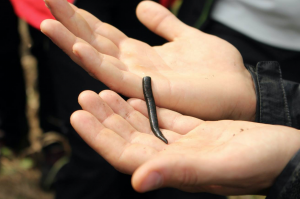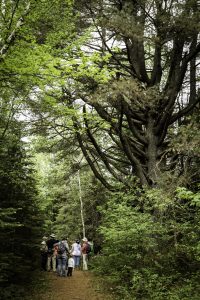Since its very beginnings, Ruisseau Jackson Natural Protected Area (RJNPA) has been interested in scientific activities led by citizens. The association organized nature walks with a trained biologist and was even awarded the 2016 Prix Action David Suzuki in recognition of its efforts to foster citizen commitment to environmental conservation. Indeed, RJNPA stood out among 200 initiatives and projects across Québec.
Bioblitz and local biodiversity
Among our upcoming activities is the RuisseauBlitz. Inspired by the popular bioblitz surveying activities, the initiative aims to gather a complete inventory of a designated area, as scientists and citizens work together to record all the living organisms they are able to identify. It’s a great way to become immersed in nature!

“In the end, we will conserve only what we love; we will love only what we understand; and we will understand only what we are taught.” Baba Dioum, Senegalese forestry engineer.
Our resources are limited and we welcome all initiatives: projects by academic researchers, citizens who want to learn more about their own backyard and daycare and school groups. We want to hear about your research, analysis and awareness-building ideas!
To take part, you must follow a scientific protocol approved by RJNPA and share our aim to enhance the collective wellbeing of current and future generations in the watershed. You must also communicate the information you gather on the territory. The data may, for example, be featured on the RJNPA website.
What is citizen science?
In the context of RJANP’s territory, citizen science may be defined as a collective effort to contribute to field research aimed at a better understand of the natural environment and ecosystem dynamics. Participants raise new questions and provide new data. They collaborate with researchers and often work under their leadership.
If you would like to share your observations on the fauna and flora or our neighboring ecosystems, please contact us! There is a range of activities that will help us achieve our mission. Click here for a list compiled by Éco-Corridors Laurentiens (in French).
Through fun and constructive initiatives, volunteers acquire new skills and help share knowledge.
Mission Monarch (https://espacepourlavie.ca/en/mission-monarch)
The Montréal Insectarium is currently conducting a huge scientific research program to help save monarch butterflies in Canada. The goal of the “Mission Monarch” study is to inventory and describe habitats where these splendid butterflies reproduce, to see whether the number and distribution of milkweed plants has an impact on the significant decline in monarch butterfly populations in North America.
Carapace Project (https://www.carapace.ca/)
Spot a turtle? Take a photo and fill in the online description sheet. Specially designed for children, the interface is simple and easy to use.
NatureWatch (https://www.naturewatch.ca/fr/)à
A community of Canadian citizens committed to collecting scientific data to better understand the nature of the environmental changes that are taking place. Specially designed for children.
Atlas des amphibiens et reptiles du Québec
A French-language site to identify the distribution of 38 species of reptiles and amphibians as accurately as possible. An objective assessment of each species’ situation will help develop thoughtful conservation actions that meet the species’ needs.
Centre de données sur le patrimoine naturel du Québec (in French)
Provides online forms to report on at-risk species and request data on threatened and vulnerable species and those likely to be designated as such under the Act respecting threatened or vulnerable species. Observations may be entered by all citizens and data mining is available for scientific and conservation purposes.
eBird Québec
Mobile application to record observations on birds and nests, follow up on the list of species and explore current data on a given territory using maps and figures. The app contributes to science and conservation by providing a better understanding of the distribution and movements of birds.
A tool to identify alien invasive species in Québec that includes an app and online mapping system. Sentinelle is a platform to report and read up on species of concern (in French).

